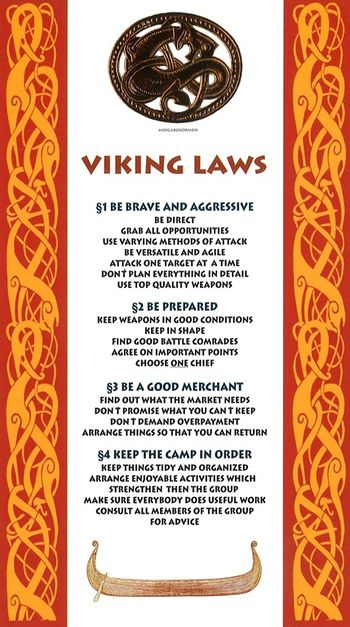Success
Definition
There are many definitions of the word success, and people have used it in several contexts, see also these Famous quotes on success.
Generally, there are two main areas where you speak of success. Firstly, success is about obtaining a singular thing (something that you get - like a new car) or achieving something through action (something that you do - like running a marathon). Secondly, success can mean a way of life, an approach to everything around (something that you are - a successful person). The second definition includes many cases of the first definition. A mindset of success is the main focus of this course.
Success from a Viking perspective
As we are from Norway, our handling of success is strongly related to the old Viking Laws.
Success and the brain
The idea of success relates to a wishing well: a device run by water deities that grants any spoken wish. It will handle both materialistic and idealistic requests. Sometimes you have to leave some token to make it work. As it turns out, our brain is just such a realisation device, as it creates reality. As we have such a powerful device, the main question is how to use it. In this wiki, we have collected results from brain research, psychology, sociology, project management, spiritual texts and studies of successful people to best use the brain for success, applying best practice principles. All successful people apply the same principles, and these principles can also boost your success and help you make your dreams come true.
Further Reading
There is a lot of literature available for success. The following list of recommended further reading is selected by the participants of the NovoEd Success course. The list is sorted alphabetically.
- 50 Success Classics: Winning Wisdom for Work & Life from 50 Landmark Books, by Tom Butler-Bowdon, 2004.
- Ask For It: How Women Can Use the Power of Negotiation to Get What They Really Want, Linda Babcock, Sara Laschever, 2008.
- Becoming Leaders: A Practical Handbook for Women in Engineering, Science, and Technology, F. Mary Williams, Ph.D. and Carolyn J. Emerson, 2008.
- Develop Your Assertiveness, Bishop, Sue, 2006.
- First things first, by Stephen Covey, 1994.
- How Remarkable Women Lead: The Breakthrough Model for Work and Life, Joanna Barsh, Geoffrey Lewis, Susie Cranston, 2009.
- How to Win Friends and Influence People, by Dale Carnegie, 1936 – I understand why it is a classic.
- I Shouldn't Be Telling You This: Success Secrets Every Gutsy Girl Should Know, Kate White, 2012.
- Lean In: Women, Work and the Will to Lead, Sheryl Sandberg, 2013.
- Learning to Lead: A Workbook on Becoming a Leader, Warren Bennis, Joan Goldsmith, 2003.
- Man’s search for Meaning, by Victor Frankl, 1946.
- Mindset: The New Psychology of Success, by Carol S. Dweck, 2008.
- Nice Girls Don't Get the Corner Office: 101 Unconscious Mistakes Women Make That Sabotage Their Careers (A NICE GIRLS Book), Lois P. Frankel, 2010.
- Play Like a Man, Win Like a Woman: What Men Know About Success that Women Need to Learn, Gail Evans, 2001.
- Primal Leadership: Learning to Lead with Emotional Intelligence, Daniel Goleman, Richard E. Boyatzis, Annie McKee, 2002.
- Secrets of Six-Figure Women: Surprising Strategies to Up Your Earnings and Change Your Life, Barbara Stanny, 2004.
- The 100$ Startup: Reinvent the way you make a living, do what you love, and create a new future, by Chris Guillebeau, 2012.
- The 15 Invaluable Laws Of Growth, John Maxwell, 2012 - This book is life-changing; the great thing is that it has practical steps and ask you lots of questions.
- The 4-hour workweek, by Timothy Ferriss, 2008.
- The 7 Habits of Highly Effective People: Powerful Lessons in Personal Change, by Stephen R. Covey, 2004.
- The Code of the Extraordinary Mind, by Vishen Lakhiani, 2016.
- The Law of Success in Sixteen Lessons, Napoleon Hill, 1928.
- The Magic, by Rhonda Byrne, 2012 - Teaches you about how to practice gratitude.
- The Millionaire Next Door, Thomas J. Stanley and William D. Danko, 1996 - Powerful book.
- The Secret Thoughts of Successful Women, Valerie Young, 2011.
- The Strangest Secret, by Earl Nightingale, 2006.
- Think and Grow Rich, by Napoleon Hill, 2009 - This has 13 life-changing principles
- V is for Vulnerable: An Alphabet for People Who Want to Make a Difference, Seth Godin, Hugh MacLeod, 2012.
- Why Good Girls Don't Get Ahead... But Gutsy Girls Do: Nine Secrets Every Career Woman Must Know, Kate White, 1996.
- Women in Science: Then and Now, Vivian Gornick, 2009.
- Wooden on Leadership: How to Create a Winning Organization, John Wooden, Steve Jamison, 2005.


